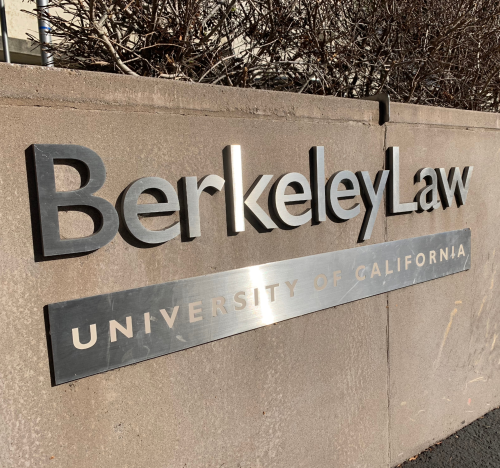Anti-Zionist policies by student groups at UC Berkeley Law fostered harassment and hatred, suit alleges

Image from Shutterstock.
A lawsuit filed Tuesday alleges that anti-Zionist policies by student groups at the University of California at Berkeley School of Law violate federal law and the U.S. Constitution.
The Nov. 28 suit says policies by student groups that exclude Zionist speakers and members violate the equal protection and free exercise clauses, interfere with the right to contract and violate Title VI of the Civil Rights Act of 1964. UC Berkeley and Berkeley Law are named as defendants.
“By failing to act …,” the suit says, “the university has enabled the normalization of anti-Jewish hatred on campus.”
Courthouse News Service, Law.com, Reuters and Bloomberg Law have stories on the suit, filed in U.S. District Court for the Northern District of California.
The plaintiffs are the Louis D. Brandeis Center and Jewish Americans for Fairness in Education.
According to the suit, at least 23 student groups have policies “that confront Jews with an unthinkable and unlawful ultimatum: Disavow an integral component of your Jewish identity—Zionism—or be denied the same rights and opportunities enjoyed by other members of the campus community.”
The suit says the environment at Berkeley Law “has erupted in on-campus displays of hatred, harassment and physical violence against Jews.”
The suit seeks an injunction that would require the university to stop funding or recognizing any student group that excludes Jewish people.
Erwin Chemerinsky, dean of Berkeley Law, told the New York Times in December 2022 that student groups have a right to ban speakers based on viewpoints. In an online message to students, Chemerinsky said requiring student groups to invite speakers with “views they loathe” would violate the First Amendment as a form of compelled speech.
Chemerinsky, an ABA Journal contributor, is Jewish and supports the existence of Israel, although he condemns many of its policies. In an October op-ed for the Los Angeles Times, he said he has himself experienced antisemitism since the Hamas attacks. “I was stunned when students across the country, including mine, immediately celebrated the Hamas terrorist attack in Israel on Oct. 7,” he wrote.
A spokesperson for the university told several publications that the suit claims “are not consistent with the First Amendment of the Constitution, or the facts of what is actually happening on our campus.” The spokesperson said the university “has long been committed to confronting antisemitism and to supporting the needs and interests of its Jewish students, faculty and staff.”
Censoring demonstrations “is not an option,” the spokesperson said, but “we do understand how upsetting and frightening” some of them have been for Jewish students. In response, “we are offering counseling support, arranging academic adjustments for impacted students when possible and have issued clear statements about the campus’s position.”



